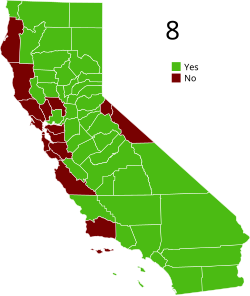California Proposition 8
| Proposition 8 | ||||||||||||||||||||||
|---|---|---|---|---|---|---|---|---|---|---|---|---|---|---|---|---|---|---|---|---|---|---|
| Eliminates Rights of Same-Sex Couples to Marry. Initiative Constitutional Amendment | ||||||||||||||||||||||
|
||||||||||||||||||||||
|
||||||||||||||||||||||
| Source: California Secretary of State | ||||||||||||||||||||||
Proposition 8, known informally as Prop 8, was a California ballot proposition and a state constitutional amendment passed in the November 2008 California state elections. The proposition was created by opponents of same-sex marriage in advance of the California Supreme Court's May 2008 appeal ruling, In re Marriage Cases, which followed the short-lived 2004 same-sex weddings controversy and found the previous ban on same-sex marriage (Proposition 22, 2000) unconstitutional. Proposition 8 was ultimately ruled unconstitutional by a federal court (on different grounds) in 2010, although the court decision did not go into effect until June 26, 2013, following the conclusion of proponents' appeals.
Proposition 8 countermanded the 2008 ruling by adding the same provision as in Proposition 22 to the California Constitution, providing that "only marriage between a man and a woman is valid or recognized in California," thereby superseding the 2008 ruling. As an amendment, it was ruled constitutional by the California Supreme Court in Strauss v. Horton, in 2009, on the grounds that it "carved out a limited [or 'narrow'] exception to the state equal protection clause"; Justice Moreno dissented that exceptions to the equal protection clause could not be made by any majority since its whole purpose was to protect minorities against the will of a majority.
Following affirmation by the state courts, two same-sex couples filed a lawsuit against the initiative in the United States District Court for the Northern District of California in the case Perry v. Schwarzenegger (later Hollingsworth v. Perry). In August 2010, Chief Judge Vaughn Walker ruled that the amendment was unconstitutional under both the Due Process and Equal Protection Clauses of the Fourteenth Amendment, since it purported to re-remove rights from a disfavored class only, with no rational basis. The official proponents' justifications for the measure were analyzed in over fifty pages covering eighty findings of fact. The state government supported the ruling and refused to defend the law. The ruling was stayed pending appeal by the proponents of the initiative. On February 7, 2012, the Ninth Circuit Court of Appeals, in a 2-1 decision, reached the same conclusion as the district court, but on narrower grounds. The court ruled that it was unconstitutional for California to grant marriage rights to same-sex couples, only to take them away shortly after. The ruling was stayed pending appeal to the United States Supreme Court.
...
Wikipedia

